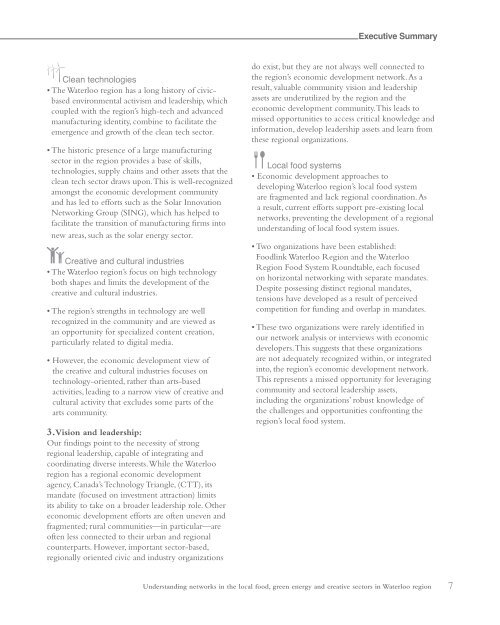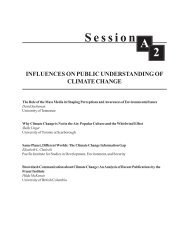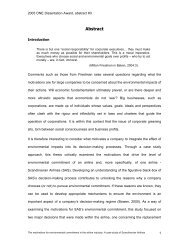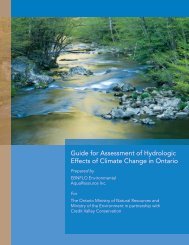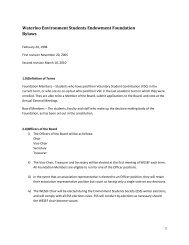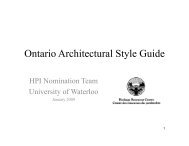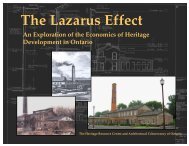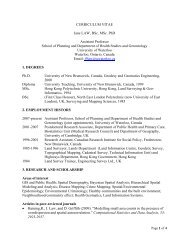2012 Vinodrai et al EDCO Taking Regional Action - Faculty of ...
2012 Vinodrai et al EDCO Taking Regional Action - Faculty of ...
2012 Vinodrai et al EDCO Taking Regional Action - Faculty of ...
Create successful ePaper yourself
Turn your PDF publications into a flip-book with our unique Google optimized e-Paper software.
Executive Summary<br />
Clean technologies<br />
• The Waterloo region has a long history <strong>of</strong> civicbased<br />
environment<strong>al</strong> activism and leadership, which<br />
coupled with the region’s high-tech and advanced<br />
manufacturing identity, combine to facilitate the<br />
emergence and growth <strong>of</strong> the clean tech sector.<br />
• The historic presence <strong>of</strong> a large manufacturing<br />
sector in the region provides a base <strong>of</strong> skills,<br />
technologies, supply chains and other ass<strong>et</strong>s that the<br />
clean tech sector draws upon. This is well-recognized<br />
amongst the economic development community<br />
and has led to efforts such as the Solar Innovation<br />
N<strong>et</strong>working Group (SING), which has helped to<br />
facilitate the transition <strong>of</strong> manufacturing firms into<br />
new areas, such as the solar energy sector.<br />
Creative and cultur<strong>al</strong> industries<br />
• The Waterloo region’s focus on high technology<br />
both shapes and limits the development <strong>of</strong> the<br />
creative and cultur<strong>al</strong> industries.<br />
• The region’s strengths in technology are well<br />
recognized in the community and are viewed as<br />
an opportunity for speci<strong>al</strong>ized content creation,<br />
particularly related to digit<strong>al</strong> media.<br />
• However, the economic development view <strong>of</strong><br />
the creative and cultur<strong>al</strong> industries focuses on<br />
technology-oriented, rather than arts-based<br />
activities, leading to a narrow view <strong>of</strong> creative and<br />
cultur<strong>al</strong> activity that excludes some parts <strong>of</strong> the<br />
arts community.<br />
3.Vision and leadership:<br />
Our findings point to the necessity <strong>of</strong> strong<br />
region<strong>al</strong> leadership, capable <strong>of</strong> integrating and<br />
coordinating diverse interests. While the Waterloo<br />
region has a region<strong>al</strong> economic development<br />
agency, Canada’s Technology Triangle, (CTT), its<br />
mandate (focused on investment attraction) limits<br />
its ability to take on a broader leadership role. Other<br />
economic development efforts are <strong>of</strong>ten uneven and<br />
fragmented; rur<strong>al</strong> communities—in particular—are<br />
<strong>of</strong>ten less connected to their urban and region<strong>al</strong><br />
counterparts. However, important sector-based,<br />
region<strong>al</strong>ly oriented civic and industry organizations<br />
do exist, but they are not <strong>al</strong>ways well connected to<br />
the region’s economic development n<strong>et</strong>work. As a<br />
result, v<strong>al</strong>uable community vision and leadership<br />
ass<strong>et</strong>s are underutilized by the region and the<br />
economic development community. This leads to<br />
missed opportunities to access critic<strong>al</strong> knowledge and<br />
information, develop leadership ass<strong>et</strong>s and learn from<br />
these region<strong>al</strong> organizations.<br />
Loc<strong>al</strong> food systems<br />
• Economic development approaches to<br />
developing Waterloo region’s loc<strong>al</strong> food system<br />
are fragmented and lack region<strong>al</strong> coordination. As<br />
a result, current efforts support pre-existing loc<strong>al</strong><br />
n<strong>et</strong>works, preventing the development <strong>of</strong> a region<strong>al</strong><br />
understanding <strong>of</strong> loc<strong>al</strong> food system issues.<br />
• Two organizations have been established:<br />
Foodlink Waterloo Region and the Waterloo<br />
Region Food System Roundtable, each focused<br />
on horizont<strong>al</strong> n<strong>et</strong>working with separate mandates.<br />
Despite possessing distinct region<strong>al</strong> mandates,<br />
tensions have developed as a result <strong>of</strong> perceived<br />
comp<strong>et</strong>ition for funding and overlap in mandates.<br />
• These two organizations were rarely identified in<br />
our n<strong>et</strong>work an<strong>al</strong>ysis or interviews with economic<br />
developers. This suggests that these organizations<br />
are not adequately recognized within, or integrated<br />
into, the region’s economic development n<strong>et</strong>work.<br />
This represents a missed opportunity for leveraging<br />
community and sector<strong>al</strong> leadership ass<strong>et</strong>s,<br />
including the organizations’ robust knowledge <strong>of</strong><br />
the ch<strong>al</strong>lenges and opportunities confronting the<br />
region’s loc<strong>al</strong> food system.<br />
Understanding n<strong>et</strong>works in the loc<strong>al</strong> food, green energy and creative sectors in Waterloo region 7


